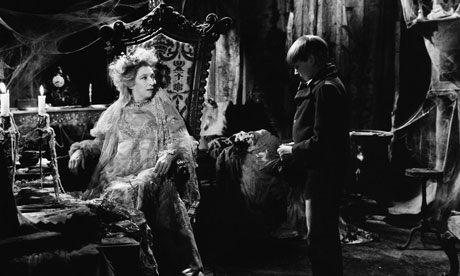
By two o'clock on New Year's Day in this Dickens bicentennial year, I already found myself wishing that either he or I had never been born. I'd accidentally caught the end of Charles Dickens' iPod on Radio 4, in which the presenter "re-imagined" the author's favourite tunes (who had imagined them before?) and notable Dickens heads vied anecdotally with each other to make us love the old curiosity writer even and ever more. I got to the off switch before the post-colonial reworking of Martin Chuzzlewit in Mumbai began.
Even before the year started, BBC TV's Songs of Praise was on the case with A Dickensian Christmas (at least no Dickens Christmas Carols from King's College Chapel). I've sat through three episodes of an eviscerated Great Expectations (great dress decay, even though I much preferred Martita Hunt's bark to Gillian Anderson's squeak). But I have been successful in not watching Stephen Fry's Dickens' amusement The Bleak Old Shop of Stuff, because I'd set myself the task of not seeing everything Fry was in over the holiday period. This only left The World's Strongest Man for my Christmas viewing, but it was worth it.
Do I need to say that I am an admirer of the writer Charles Dickens? I would have everyone get all the pleasure available from reading his books, and the more considered adaptations of his works in film and on television are delightful. What I can't bear is the urgency. One of the great things about being dead – maybe the only great thing about being dead – is the sudden and continuing lack of urgency. It gives you, and generations not yet born, plenty of time.
For the last century and a half, people have taken their time enjoying Dickens, discovering his books, picking them up, putting them down, turning the pages, regretting having reached the end, reading favourite bits again. Books are marvellous like that: available (allowing for the survival of bookshops and libraries) any time you want, whether the death of the author has occurred or not. In quite another universe, the media exists: newspapers, radio, TV, all terrified of running out of material, their workforce having to wake up every morning with enough ideas to fill pages, silence and screens. On Good Friday in 1930, the six o'clock newscaster told his listeners, "There is no news tonight", and signed off. I long for a blank column, an empty screen, because nobody has come up with anything good enough to fill them. But instead, for times of dire need or ongoing lassitude, we have anniversaries.
There is, I presume, a book of anniversaries, so that broadcasters and journalists can pre-fill the airwaves and newsprint years ahead. It provides an easy subject but invariably leads to a terrible overkill.Radio 3 had a spate of broadcasting the complete works of composers, all day, every day, for up to a week until they got to the end. Perhaps there's a certain charm in, or even an avant garde case to be made for, obsessive compulsive broadcasting. But I sympathised when eventually, during Bach week, a strangulated email arrived from a broken listener, crying, 'Oh God, not another bloody cantata …' Be warned: coming up in 2013, the centenary of Albert Schweitzer's arrival in Africa and Wagner's bicentenary.
Anniversary programming induces producers to compensate for their laziness by imagining they are doing the work of mass education. And like the current patronising view of education generally, it means banalising the complex: cutting out the detail and the difficult, wrenching everything into "relevance" and emphasising storytelling over form, structure or ideas. Good too, if you can push a bit of scandalous autobiography into the reluctant mouths you imagine need to be spoonfed.
In effect, when the media takes on the burden of giving us Dickens for our own good, they are reading him for us, presenting the Dickens they think we can manage – pre-digesting it, like parent birds offering their chicks ready, stomach-churned food. It's so easy, just a technical trick, these days to make beautiful moving pictures of sentimental poverty in the misty marshes of Kent, to present appealing and familiar actors who speak in a special Dickensian-modern to make it feel just a little, but not too, heritage-included.
It's harder, and so much more interesting, for Dickens to have written Great Expectations, sentence by sentence; and then, a month later or 150 years on, for someone else to read those sentences and have them build into the collaboration between the author and their reader that books are, at their best. Then go off and watch Martita Hunt be Miss Havisham and enjoy – but only as and when you feel like it.

